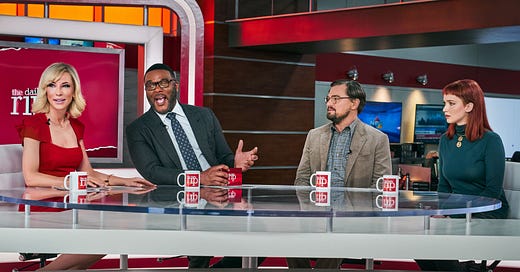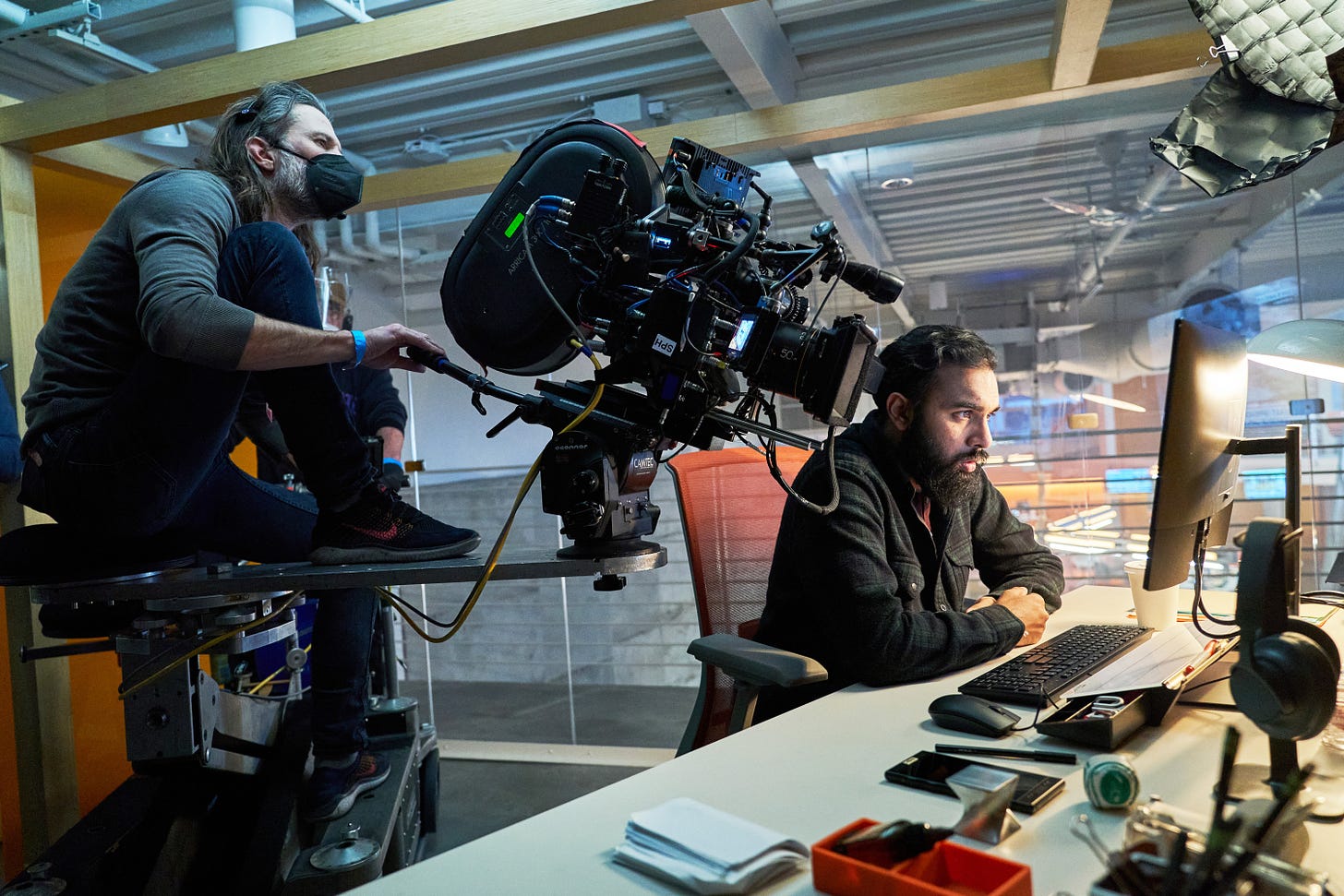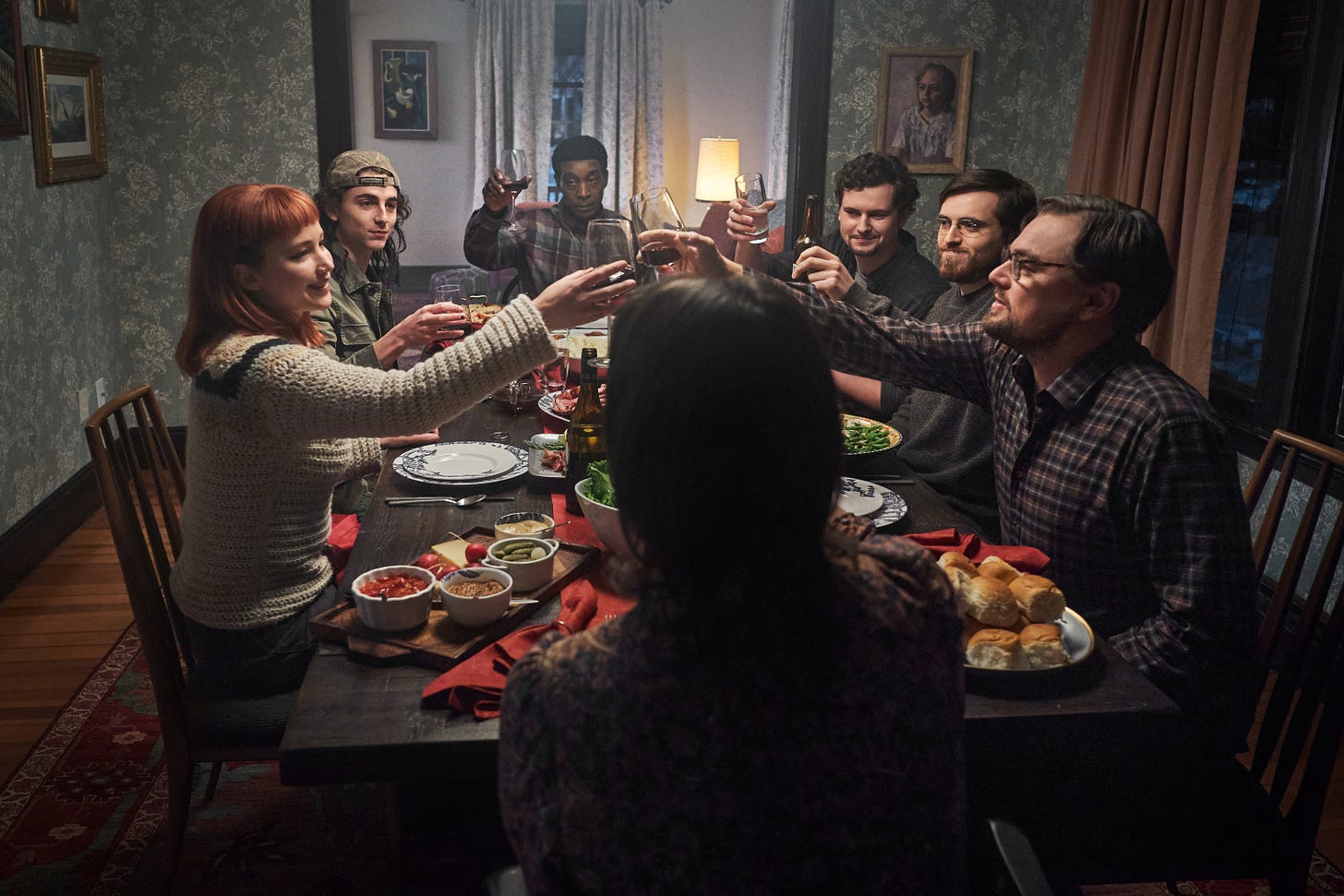One of the most devilish aspects of climate change is that it resists good art. But Adam McKay, director first of comedies like Anchorman and later of more serious fare like The Big Short, has cracked the code. Don’t Look Up (in theaters today; coming to Netflix on Dec. 24) is the first climate movie — the first work of art about climate change of any kind — to hold my rapt attention from start to finish. It is fantastic.
One reason it’s so good is that it isn’t really about climate change at all. It’s about a pair of scientists, played by Leo DiCaprio and Jennifer Lawrence, who discover that a large comet is heading directly toward Earth and will strike, and wipe out all life on the planet, in just over six months. They try to tell people. It does not go well.
Don’t Look Up attempts to capture, not so much climate change itself, but one of the most vertiginously weird aspects of understanding climate change: you know this terrible thing is coming and yet … no one’s acting like it. You end up feeling like the ranting guy on the street corner waving a sign about how the end is nigh.
The movie is about having knowledge but being unable to make the knowledge matter, being unable to make anyone hear or act on it. By compressing the timeline to six months and making the threat a singular force, visible in the sky, it brings the absurdity of the situation to the surface. It’s hilarious, and if you’ve spent years banging your head against a wall trying to get people to pay attention to climate change, you will find a great deal of catharsis in the laughter.
Before we get to the movie, a word on climate and art.
Climate change makes for bad art
By its very nature, climate change is abstract, the sum of millions of observations and long chains of reasoning. It unfolds slowly, over the course of decades and centuries. Its effects are felt incrementally, across the globe, in disparate ways.
In short, climate change isn’t a good villain. It has no plans or intentions. It’s not even a singular force, it is simply the descriptor we apply to the panoply of changes happening around us.
The magic trick of good art is that it uses specificity — particular people, places, and relationships — to evoke universal human feelings. We have been designed by evolution to feel most intensely about things that are close to us, within spatial and temporal boundaries that are legible to us. We’re not designed to feel anything about a projected 50-year change in global average temperature.
We can know and understand that forecast in an intellectual way, but to really feel it, to integrate it into one’s basic narratives and worldview, requires conscious cultivation. It does not come naturally; it is not universal.
That makes climate change a lousy subject for art. Over the years that I have been writing about it I have been exposed to many, many songs, poems, documentaries, short stories, and novels about it. They are all like vegan food: the intentions are commendable, the spirit is good, it even looks on the outside like normal food, but the taste … let’s just say, it feels like I’m supposed to be eating it, and if I weren’t supposed to, I’d be eating something else that tastes better.
(Vegans: I love you. Please do not write me angry emails.)
So too with climate art. It runs into one or more of four main dangers.
One, it can be treacly. This is most climate documentaries: swelling orchestral music beneath shot after shot of Natural Beauty Under Threat.
Two, in order to compress climate change into something dramatic on a human time scale, it can mangle the science, as in 2004’s The Day After Tomorrow, wherein a key scene finds our heroes fleeing from an oncoming wall of, uh, freezing. It’s not that I’m a stickler for strict scientific accuracy in art, but once you make climate change into a disaster fit for a disaster movie, you’ve changed all the structural features that make the climate crisis what it is. You’re not illuminating anything about the reality.
Three, it can be overly oblique, a metaphor for climate change that is so generic — “nature is good” (Avatar); “dystopia is bad” (Snowpiercer) — as to say nothing about climate change in particular.
Fourth, it can end up being didactic or educational. Though it is by all accounts informed and magisterial, I could could not get through Kim Stanley Robinson’s The Ministry for the Future. After an intense first chapter, it became a series of white papers teaching me stuff I already know. If I wanted to read PDFs I’d just read PDFs.
Climate is perilous territory for art. That brings us to Don’t Look Up.
Don’t Look Up defies the trend
I went into this film with extremely low expectations. I’ve seen the subject of climate change humble too many eager artists and storytellers to have much faith that anyone in Hollywood would get it right.
When I heard the basic setup — an analogy that everyone in the climate world has pondered at some point — my expectations did not rise. There are so many ways a story like that could go wrong. It could be broad or ham-handed; it could be overly clever; it could be didactic and preachy.
But somehow it’s great. I suppose that’s what happens when you get this idea in the hands of smart writers (politics’ own David Sirota helped with the story; McKay wrote the screenplay) and an unbelievably stacked cast.
DiCaprio and Lawerence convincingly shrink into nebbishy scientists, he with a middle-aged gut, she with unfortunate bangs. The MAGA president and the boozy cable news host could easily have been caricatures, but Meryl Streep and Cate Blanchett are incapable of a false note. Every role down to the most incidental is played by marquee performers who fill their screen time with thoughtful choices. Every performance lands, keeping the proceedings grounded even as they grow more ridiculous.
It’s extremely funny, but not with rat-a-tat jokes. These are recognizably human characters, not broad types, stuck in absurd situations; the laughs arise out of the structure. There’s an editing technique used again and again: just as a scene is in the midst of its manic peak, there will be a hard cut to a new, quiet scene, often characters trying to process what happened. It made me laugh every time. (Credit to the venerable Hank Corwin for editing.)
Though it flirts with it at times, it never descends into farce. It’s just that everyone finds themselves lost in the same disorienting information environment, unable to connect.
Also? About two-thirds of the way through the movie, Timothée Chalamet wanders in as a character with no obvious connection to the plot and no clear reason to be there, but who is nonetheless an absolute delight for every second he’s on screen.
The film manages to be funny and allegorical and human all at once. But I think long-time climate hawks will take special pleasure in it.
So many climate feels, captured for the first time
I have no idea how normal people — people who haven’t spent most of their adult lives immersed in the subject of climate change — will process this movie. Will they see the climate analogy at all? It could just as easily be read as an analogy for Covid, or biodiversity loss, or nuclear war.
But if you’re a climate hawk, there’s no mistaking it: McKay has clearly been involved in this subject for a while. He captures a whole series of feelings and experiences that are painfully familiar.
There’s the feeling of telling the government about a threat and having it shrugged off. There’s the feeling of telling the press about the threat and having it subsumed and lost in the flattening stream of 24-hour content. There’s the feeling of being mocked and memed for being alarmed. There’s the feeling of needing to prove people wrong on the internet.
There’s the feeling of watching a body of science become the target of wild conspiracy theories and a partisan culture war. There’s the feeling of seeing the most obvious solutions to the problem delayed and deferred over corporate profits. There’s the feeling of seeing people jump straight from denial to nihilism, without any being-helpful stage in the middle. There’s the sinking feeling of watching people who have accepted the threat turning to glittery promises of future high-tech solutions.
There’s the feeling — which DiCaprio captures in a mid-movie rant that I, at least, found incredibly emotional — of hoping against hope that someone in charge, despite all the appearance of venality and stupidity, knows what they’re doing, has a handle on this thing.
And perhaps most acute of all, there’s the feeling that we simply can’t communicate any more, that there’s no way to establish a shared reality or shared priorities. Everything is absorbed by the information/media/entertainment machine, blasted out at the same volume as dozens of other daily clickbait outrages, and soon forgotten, like all the rest. Nothing lands, nothing sticks. There’s no way to cut through the noise.
“If we can’t all agree at the bare minimum that a giant comet the size of Mt. Everest hurtling its way toward planet Earth is not a fucking good thing,” DiCaprio cries, his voice cracking, “then what the hell happened to us? I mean, my God, how do we even talk to each other? What have we done to ourselves? How do we fix it?”
The movie does not offer answers to these questions. Without any spoilers, I can say it’s a pretty pessimistic take on our capacity for collective action. But I found it incredibly cathartic just to see my specific brand of anguish portrayed with such insight, more than I ever expected from a big-budget Hollywood movie.
Back here in the real world, climate remains stubbornly uncathartic. It has no six-month deadline; it will play out slowly over our whole lives and beyond. There will be no final moment of recognition and no clear line between success and failure. The result will be an unsatisfying muddle at every stage, with more suffering than there should have been but less than there could have been.
Still, we know that, in some sense, the comet has already begun striking. We’ve already lost some stability, some biodiversity, some lands and lives, and we will lose more, no matter what we do. It’s baked in at this point. We are living in the most stable climate we will ever experience. Every decade from now on will get warmer — more of the comet will strike. We can only control the scale of the damage.
After I watched Don’t Look Up (thank you Netflix), as I was eating dinner with my family, I couldn’t stop thinking about DiCaprio’s final words in the movie, as he is surrounded at the dinner table by family and friends: “We really did have everything, didn’t we?”


















Share this post